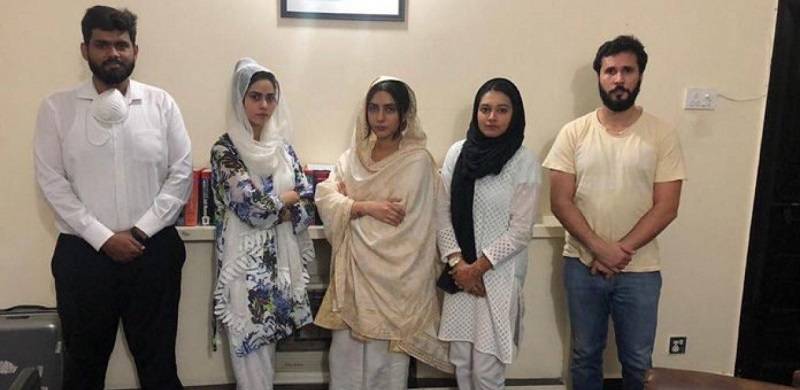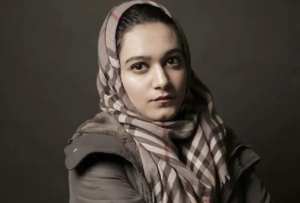
Khadija Siddiqui became a contemporary icon of Pakistan's struggle for a society where survivors of violence are able to get justice via the judicial system. Together with lawyer Hassaan Niazi, she had taken up the case of the violent attack on the home of actress Uzma Khan by a number of wealthy, well-connected women and their armed guards.
Within a few days, however, the lawyer announced that she was distancing herself from her new clients.
Naya Daur Media spoke to her to find out what happened.
***
Naya Daur Media: What made you initially decide to take up the case?
Khadija Siddiqui: A video sparked social media uproar. Each one of us saw the edited version initially and the complete one later on.
We saw how power was blatantly misused - how a dozen armed men and 3 women barged into someone's private space, attacked them and vandalised property. Broken glass was strewn around the whole place, blood stains were seen on the floor and the girls were seen begging for mercy but none was shown.
When I went to London for my bar course, we were taught professional ethics as a subject which encompasses some core duties. The cab-rank rule is one of those. It is based on the non discrimination principle, whereby just because a prospective client has attracted public disapproval, you cannot refuse to take a case. Everyone is entitled to competent representation, regardless of the nature of their case. This is why I took up the case professionally and with a belief that these women were wronged.

Naya Daur Media: What actually changed to make you dissociate yourself: developments in the case itself, or facts that you subsequently learned, etc?
Khadija Siddiqui: When I initially took up the case, I made it clear to my clients that there would be immense pressure on them to settle out of court - and in that eventuality I would be miles away from them. They were quite aware that they were battling with a mighty force, so the chances of getting justice in an already broken system were bleak.
As far as the legal battle was concerned, my assistance was fully available to them. However reaching a settlement was their prerogative and was completely up to them. As an advocate my responsibility is to act with honesty and independence and to be part of any out-of-court settlement would have not only undermined my independence but also diminished the confidence that the public places in our profession. Therefore, it was with informed consent that I withdrew from the case. At a time when rumours of a compromise started spreading and our legal team completely lost its connection with the clients, that is when I dissociated myself.
Naya Daur Media: What exactly is the role of Malik Riaz in the whole case?
Khadija Siddiqui: I don't think Malik Riaz can be directly implicated in the case. Having said that, his name was used by his own daughters. The video which went viral was made by one of the daughters involved in the case, and we all witnessed the "Do you know who I am?" syndrome, blatantly on display.
So his role cannot be completely disregarded.
Nonetheless we have generally seen this sense of entitlement and how might is always right in Pakistan. We talk about the law being equal for all, but unfortunately there is one law for the weak and vulnerable, and another law for the powerful.
Within a few days, however, the lawyer announced that she was distancing herself from her new clients.
Naya Daur Media spoke to her to find out what happened.
***
Naya Daur Media: What made you initially decide to take up the case?
Khadija Siddiqui: A video sparked social media uproar. Each one of us saw the edited version initially and the complete one later on.
We saw how power was blatantly misused - how a dozen armed men and 3 women barged into someone's private space, attacked them and vandalised property. Broken glass was strewn around the whole place, blood stains were seen on the floor and the girls were seen begging for mercy but none was shown.
When I went to London for my bar course, we were taught professional ethics as a subject which encompasses some core duties. The cab-rank rule is one of those. It is based on the non discrimination principle, whereby just because a prospective client has attracted public disapproval, you cannot refuse to take a case. Everyone is entitled to competent representation, regardless of the nature of their case. This is why I took up the case professionally and with a belief that these women were wronged.

Naya Daur Media: What actually changed to make you dissociate yourself: developments in the case itself, or facts that you subsequently learned, etc?
Khadija Siddiqui: When I initially took up the case, I made it clear to my clients that there would be immense pressure on them to settle out of court - and in that eventuality I would be miles away from them. They were quite aware that they were battling with a mighty force, so the chances of getting justice in an already broken system were bleak.
As far as the legal battle was concerned, my assistance was fully available to them. However reaching a settlement was their prerogative and was completely up to them. As an advocate my responsibility is to act with honesty and independence and to be part of any out-of-court settlement would have not only undermined my independence but also diminished the confidence that the public places in our profession. Therefore, it was with informed consent that I withdrew from the case. At a time when rumours of a compromise started spreading and our legal team completely lost its connection with the clients, that is when I dissociated myself.
Naya Daur Media: What exactly is the role of Malik Riaz in the whole case?
Khadija Siddiqui: I don't think Malik Riaz can be directly implicated in the case. Having said that, his name was used by his own daughters. The video which went viral was made by one of the daughters involved in the case, and we all witnessed the "Do you know who I am?" syndrome, blatantly on display.
So his role cannot be completely disregarded.
Nonetheless we have generally seen this sense of entitlement and how might is always right in Pakistan. We talk about the law being equal for all, but unfortunately there is one law for the weak and vulnerable, and another law for the powerful.
